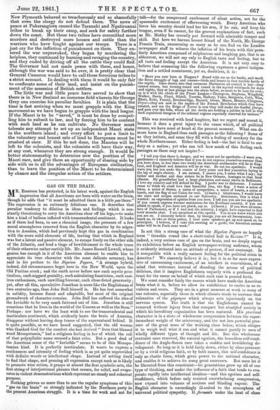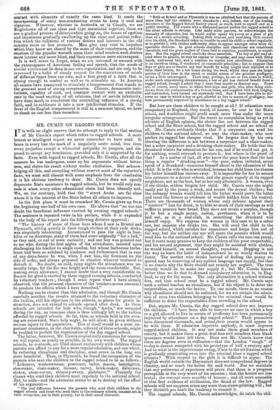GAS ON THE BRAIN.
MR. Emerson has protested, in his latest work, against the English impression that all Americans are born with water on the brain, though he adds that "it must be admitted there is a little gas there."' The expression is an extremely felicitous one. It describes that peculiar tendency to dilation in ideas and feelings which is con- stantly threatening to carry the American clear off his legs,—to make him a kind of balloon inflated with transcendental sentiment. It looks as if there had been, to use a chemical image, the pressure of a few moral atmospheres removed from the English character by its migra- tion to America, which had previously kept this gas in combination with the more solid elements of life, leaving that which in England was but a latent and passive element, to escape freely on the other side of the Atlantic, and lend a tinge of bewilderment to the whole tenor of their otherwise rather earthly life. Mr. James Russell Lowell, whose genius has enough in it of the American element to enable him to appreciate its true character with the most delicate accuracy, has said in his preface to the Bigelow Papers, "A strange hybrid, indeed, did circumstances beget here in the New World, upon the Old Puritan stock; and the earth never before saw such mystic Kee- ticalism, such niggard geniality, such calculating fanaticism, such cast- iron enthusiasm, such unwilling humour, such dose-fisted generosity; yet, after all this, speculative Jonathan is more like the Englishman of two centuries ago, than John Bull himself is. He has lost somewhat in solidity, become fluent and adaptable, but most of the original groundwork of character remains. John Bull has suffered the idea of the Invisible to be very much fattened out of him. Jonathan is still conscious that he lives in the world of the -Unseen as well as the Seen." Perhaps : nor have we the least wish to see the transcendental and inarticulate sentiment, which evidently heats the brain of America, disappear without leaving deep traces of the supernatural behind. It is quite possible, as we have heard suggested, that the old woman who thanked. God for the comfort she had derived " from that blessed word Mesopotamia," had a religious feeling in her of which the roll of that polysyllabic name seemed a faint echo. But a good deal of the American sense of the " Invisible " seems to be of this Mesopo- tamian kind. It is perfectly inarticulate. It wants to express a restlessness and intensity of feeling which is as yet quite unprovided with definite words or intellectual shape. Instead of setting itself to find that shape, and pruning all expression except such as is likely to promote wise action, it grasps at almost the first symbolic acts, the first string of interjectional phrases that occurs, for relief, and evapo- rates in violent demonstrations which represent no steady and coherent purpose.
Nothing grieves us more than to see the regular symptoms of this "gas on the brain" so strongly indicated by the Northern party in the present American struggle. It is a time for work and not for talk—for the compressed excitement of silent action, not for the spasmodic excitement of effervescing wrath. Every American who loves his country should lend her his arm, if he can, and keep his tongue, even if he cannot, for the gravest explanations of fact, such as Mr. Motley has recently put forward with admirable temper and skill. But here we havean holiest friend of the North, Mr. George Francis Train, summoning as many as he can find on the London newspaper staff to witness the inflation of his brain with this pecu- liarly American compound of sulphurous and laughing gas, that is so abhorrent, we will not say only to English taste and feeling, but to all taste and feeling except the American. It is not very easy to believe that screaming like the following expresses a grave indigna- tion and a settled resentment, yet so, doubtless, it is : " Have you ever been at Niagara? Stand with me on the banks, and mark the fierce struggle of logs and canoes—birds and beasts in that terrible battle of the rapids. Once drawn into that ravenous Maelstrom all control is lost—they cannot return, but turning round and round in the myriad whirlpools for days and nights, they at last plunge into the abyss below, no more to be seen for ever; so is it with the chiefs of the Pirate League—Thompson, Stephens, Wingfield, Walker, Davis Floyd, Slidell, Toombs, Mallory, Yulee, Benjamin, Cobb, -Wise, Rhett, Keitt, Yancey, Breckenridge, Bayard, Green, Mason, Hunter, Clingman, Pryor—they are now in the rapids of the French Revolution which they have created, and ere the Reign of Terror is over they will make the fearful plunge, and pass over the falls, where all the devils are holding a jubilee in hell in that dark sepulchral dungeon of the infernal regions especially reserved for traitors."
This was received with loud laughter, but we regret and resent it, because it does a great injury to the cause which, of all political causes, we have most at heart at the present moment. What can do more harm in England than such passages as the following? Some of us they irritate, and some they fill with a feeling of mockery for the whole Northern cause. Either feeling is bad—the last is fatal to our duty as a nation; yet who can tell how much of this feeling such passages as these may not inspire?—
" I tell you that there is danger, and we must not be apathetio—I warn you, gentlemen—I sincerely believe that if you do not express yourselves warmer than you have done, in less than two weeks the American ambassador will be in Eng- land, and England and America will be at war. Be not too apathetic. I would warn you lest you undo the course of forty years and find yourselves laying in the lap of negro slavery. I am earnest, I assure you, I mean what I say; my father and mother and dear sisters lie in New Orleans, hostages to that fatal climate. My grandfather had a large plantation and many slaves in Baltimore. I love my country and will defend its flag. I prefer war to dishonour. I cannot cease to think we shall love that beautiful idea, the flag. I want a union of lakes, a union of States, a union of sympathies, a union of hearts, a union of hands, and the flag of our Union for ever. (Cheers.) Gentlemen' 1 would have the stars and stripes endorsed on our fraternity. Gentlemen, this is what I wanted: an expression of opinion from you here. 1 tell you you are too apathetic. If you cannot express wanner sentiments for the Northern country, if you are afraid to speak, it you have not pluck, say so. (Cheers.) If you were all mem- bers of Parliament, or if I had met the ministry, 1 might have expected to find their mouths shut. I am surprised at this apathy. You do not know which side you are on. I sincerely believe that, by George, you are all Secessionists, inas- much as, in two or three points, I hear some speakers get up and speak on its principles. I believe, if I take this meeting as a guide, the American ambas- sador will be in Paris next week."
Is not this a strong case of what the Bigelow Papers so happily term " thrashin round like a short-tailed bull in ill-time ?" It is, indeed, a very serious case of gas on the brain, and we deeply regret its exhibition before an English newspaper-writing audience, whom it evidently irritated into an attitude of protest, if not contempt. Is it compatible with a really earnest feeling for the political crisis in America ? We sincerely believe it is; but it is so far more expres- sive of unreasoning excitement, of an intellect in convulsions, of a mind that welcomes instead of dreading the access of political delirium, that it inspires Englishmen unjustly with a profound dis- trust for the cause on behalf of which such rant is poured forth.
We must consider fairly the causes which have made the American brain what it is, before we allow its exhibitions to excite in us re- vulsion and scorn. They are in a great measure at work in many of our colonies, especially those in which climate tends to increase that relaxation of the physique which always acts injuriously on the nervous system. The truth is that the Englishman cannot be removed without injury from that compact but stratified society in which his hereditary organization has been matured. His practical character is in a state of wholesome compression between the super- incumbent weight of the aristocracy, and the not less powerful pres- sure of the great mass of the working class below, which obliges it to weigh well what it can and what it cannot justify to men of wholly different types of thought and life. But this wholesome restraint once removed, the natural egotism, the boundless self-confi- dence of the Anglo-Saxon race takes a sudden and bewildering de- velopment. So long as it is held fairly down, either by class-pressure or by a vivid religious faith, or by both causes, this self-confidence is only an elastic force, which gives power to the national character, and enables it to achieve its many great successes. But once let it be liberated from this constraint—let generations grow up all of one type of thinking, and under the influence of a faith that tends to eva- porate rapidly into intellectual idealism—and this egotism and self- confidence, which before only resisted overwhelming compression, now expand into volumes of noxious and blinding vapour. The English character is exceedingly ill-suited to the atmosphere of universal political sympathy. It ferments under the heat of close
contact with elements of exactly the same kind. It needs the interspersingof many non-conducting strata to keep it cool and vigorous. Wherever, whether in Australia or iu Canada, we see Englishmen all of one class and type associated together, there we see a gradual process of deterioration going on, the fumes of egotism and impatience gradually swallowing up the clear and patient reflec- tion which the collisions of various desires and interests in the old country more or less promote. Men give easy vent to impulses which they know are shared by the mass of their countrymen, and the reaction of the popular warmth upon their mind renders !inch desires more intense and more blind, and their expression more extravagant. It is well never to forget, when we are incensed or amused with the extravagance of American feeling and speech, that the seeds of similar excitement lie deep in our own organization, and are only to be repressed by a habit of steady respect for the convictions of minds of different types from our own, and a firm grasp of a faith that is strong enough to control as well as to stimulate us. In America all causes have concurred to stimulate a temperament that stands in the greatest need of strong compression. Climate, democratic insti- tutions, equality of rank, and constant contact with an excitable race in the most exciting of all relations, that of servile inferiority, have done much to counteract the controlling influence of a strong faith, and to sublimate it into a new intellectual stimulus. If the fever of the English temperament is still in a measure latent, we have to thank no one less than ourselves.































 Previous page
Previous page